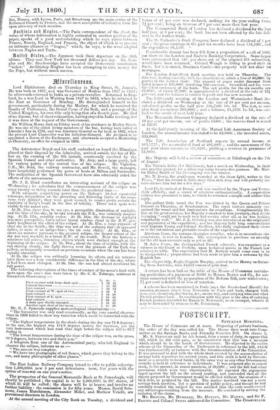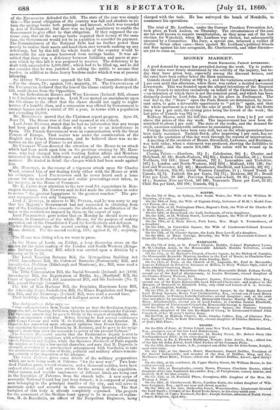POSTSCRIPT.
SATURDAY IfORN1NG.
The House of Commons sat at noon. Disposing of private business, the order of the day was called for. The House then went into Com- mittee on the Savings Banks and Friendly Societies Bill. On clause 1,
Mr. S. ESTCOURT said he felt bound, from a sense of duty, to oppose this bill, which he did with pain, as he considered that this was a measure which should be in the hands of Government. He objected to the entire scheme of the Chancellor of the Exchequer in reference to the bill, which' was fundamentally at variance with the recommendation of the Committee. It was proposed to deal with the whole stock created by the accumulation of savings bank depositors for several years, and this stock is held by Govern- ment as a security to local banks, in the same way as any other Government security is held in reference to individuals. It was proposed also to cancel stock, to the amount, in round numbers, of 29,0001.; and the bill had other provisions which were very objectionable. He repeated the arguments urged against the bill on the second reading, and contended that all the objects proposed by Government would be effected without the creation of a bosk debt, as proposed by the bill. The matter involved was not a mere savings bank question, but a question of public policy, and though he had carefully studied the subject he was satisfied that the evils would exceed any advantages resulting from the measure. He concluded by moving the 'omission of the clabse. MT. BRISCOE, Mr. HUBBARD, Mr. HENLEY, Mr. Moray, and Sir F. BARING and Colonel SYKES addressed the Committee. The CHANCELLOR
of the EXCHEQUER defended the bill. The state of the case was simply this :-The moral obligation of the country: was full and absolute to re- turn the savings banks both principle and interest, which was recorded in Acts of Parliament; but there was no legal machinery to enable the Government to give effect. to that obligation. If they supposed the ex- treme case, that all the savings banks required their money at the same time, the Government would not be in a position to consider its payment. The Commissioners of the National Debt had no further power than merely to realize their assets and hand them over towards making up any deficiency, but by this bill the whole funds of the country would be answerable for any money borrowed from savings banks. It was ad- mitted that there was a deficiency between liabilities and assets at pre- sent which by this bill it was proposed to recover. The deficiency to be dealt with amounted to 3,500,0001., which had to be filled up, and he did not consider that he was justified in asking the public to assume that burden, in addition to those heavy burdens under which it was at present labouring. Sir Ilsaniv WILLOUGHBY opposed the bill. The Committee divided : -For the clause, 78; against, 116; majority, 38. The CHANCELLOR of the EXCHEQUER declared that the loss of the clause entirely destroyed the bill, amid cheers from the Opposition. On the Refreshment Houses and Wine Licences (Ireland) Bill, clauses 1 to 5 inclusive were agreed to. Lord NAAS moved an amendment upon the 6th clause to the effect that the clause should not apply to night- houses of a humble class, and a concession was offered by Government to exempt houses under a rental of 20/. a year, in towns with a population not exceeding 10,000. Mr. HENNESSEY moved that the Chairman report progress. Ayes 28, Noes 79. The House rose at four and resumed at six o'clock.
Lord Jomc Russna, stated that he had no information that any troops had been placed on French ships with a view to an interference in Syria. The French Government were in communication with the Great Powers of Europe. That matter was under the consideration of the English and French Governments, and he believed there was no in- tention on the part of France to act alone.
Sir Cue.nr.Es WOOD directed the attention of the House to an attack which had been made upon him on the previous evening by Mr. Hors- man, who had charged him with treating Indian affairs and Members interested in them with indifference and negligence, and an overbearing manner. He denied in detail the charges which had been made against him.
Mr. HORSMAN, in the course of a vigorous attack upon Sir Charles Wood, accused him of not dealing fairly either with the House or with his colleagues. Lord PALMERSTON said he never heard such a lame excuse for the most discourteous and unfair proceedings ever taken, in his memory, in the House of Commons.
Mr. E. JAMES drew attention to the new road for equestrians in Ken- sington Gardens. Mr. COWPER said he had made the alteration in order to secure "the greatest happpiness to the greatest number." The pre- sent arrangement was only temporary. Lord J. RUSSELL, in answer to Mr. PULLER, said he was sorry to say that her Majesty's Government had not succeeded in obtaining from any of the Continental Governments the abolition or modification of the taxes or the restrictions imposed by them on the export of rags. Lord PALMERSTON gave notice that on Monday he should move a re- solution, in Committee of the whole House, for the purpose of making vision out of the Consolidated Fund for fortifications and defences.
fter discussion upon the second reading of the Maynooth Bill, the use divided. For the second reading, 135; against it, 57; majority, he House was sitting when we went to press.
n the House of Lords, on Friday, a long discussion arose on the on for the third reading of the London and South. Western (Kings- Railway Extension) Bill, which was carried upon a division by a ority of 33 to 32.
The Local Taxation Returns Bill, the Metropolitan Building Act (1855) Amendment Bill, the Colewort Barracks (Portsmouth) Bill, and Annuity-tax Abolition (Edinburgh and Montrose), &c., Bill, were read a third time and passed. The Tithe Commutation Bill, the Burial Grounds (Ireland) Act (1856) Amendment Bill, the Registration of Births, &c., (Scotland) Bill, the Court of Queen's Bench Act Amendment Bill, and the Inclosure (No. 2) Bill, passed through Committee.
The Isle of Man Harbour Bill, the Dominica Hurricane Loan Bill, the Admiralty Court Jurisdiction Bill, the Mines Regulation and Inspec- tion Bill, and the Tramways (Ireland) Bill, were read a second time. Their lordships then adjourned at half-past seven o'clock.



























 Previous page
Previous page